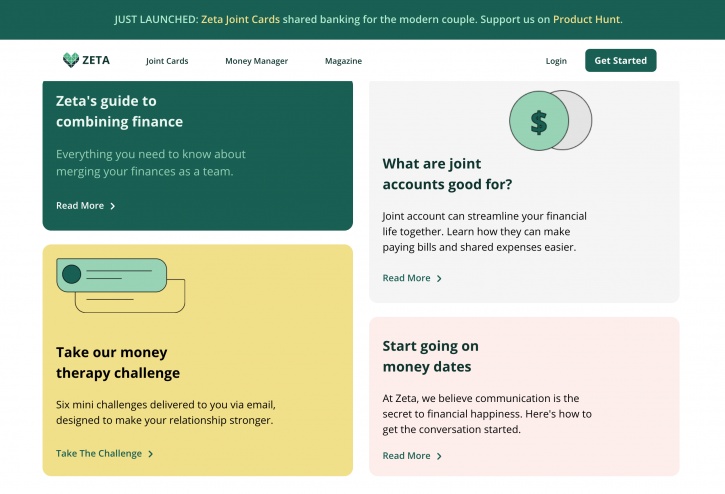Header Title
Personal finances more than just individual
Personal finances are based on the premise of the sovereign individual. Zeta provides joint finances for modern couples, and rethinks a fundamental financial paradigm
My money is mine
Banking, personal finances and all the many accoutrements of having money have always been fundamentally individual – my money is mine. The identification/authentication procedures – and all the accompanying regulation, monitoring and taxation – are fundamentally individual, whether via signature, fingerprint, passport or iris. This premise has become a sine qua non of the personal banking infrastructure and mindset, reinforced by strong societal memes that include the concept of the sovereign individual and the holy grail of “privacy”, now gone digital.
Banking meets real-life relationships
US-based Zeta is a startup working on providing joint finances for modern couples – however that may be (self-)defined. The company aims to help do away with the money chores side of being in a relationship with a “significant other”.
Zeta services focus exclusively on couples and families, helping them do things like paying bills, dealing with expenditure items and saving money to plan for a (hopefully still shared) financial future. Zeta apparently also has plans to support families in other, broader ways over time, including being involved in tax payments and assessments or prenuptial agreements.
Of course, the flip-side of shared finances is dealing with the practical and monetary repercussions of ending that relationship if life gets in the way. There still isn’t an algorithm for that.
The Zeta business model hinges on the idea that people want to share their finances in an ongoing and meaningful way – and also that the world of finance is to at least some extent ready to shift from traditional individualism to a wider mutual involvement.
love and money content to help your relationship thrive
Responsive banking
Zeta’s basic narrative involves providing banking services that adapt to the changing needs of people’s relationships, no matter what stage they’re at – dating, moving in together or married. And that it is the individual, rather than the individual’s bank or employer, who decides the framework (within Zeta product capabilities, of course).
This effectively turns the banking business model on its head. Banks have always been in the driving seat for defining and dictating terms and conditions, thus forcing a lot of square pegs into conveniently round administrative holes. The rigidity and conformity of the banking sector have resulted in a “take it or leave it” non-choice that may have been understandable in the days of (partly) analogue processing of banking procedures. But in the digital world the basic costs of administration are pretty much the same, regardless of configuration. Customer-centricity becomes more a question of good systems design and responsive configurations of key customer-facing services.
Fintech has been lagging way behind many other industries in terms of product and service individualisation, but Zeta seems to be making a bit step beyond that, with personal financial services as part of a much larger and more interesting “life conditions” narrative, combining financial issues with other key personal concerns.
A multiplayer world
The Zeta business model hinges on the idea that people want to share their finances in an ongoing and meaningful way, and that the world of finance is ready to shift from traditional individualism to a wider sense of collaboration and joint concern. From single owner to multiplayer, from sovereign individual to engaged partner, etc.
When many kinds of digital structures are taking the multipartite path to collaborative work and play structures, it would seem time for banks to wake up and smell the coffee. Money is now just one part of a much wider story about personal values, life choices and sharing mindsets, and one of the last to get seriously digital.
Part of a bigger picture
Personal finance products and services are almost always rigorously ring-fenced by national legislative restrictions and taxation jurisdictions. The US is relatively big in this field, because of the size of their potential national market. There are also lots of digital payment services such as Zelle, as well as the whole field of neobanking and open banking.
Within and beyond all this, social finance is a big and growing sector, featuring relatively simple. limited-scope “sharing expenses” apps, such as Venmo and Splitwise. These operate at the expenditure point of focus, while later and more ambitious setups and business models consist of socially focused and consumer-friendly financial services that enable sharing money at the account and transaction level. Braid is an example for enabling users to create flexible, group accounts for shared spending where you make the rules. Braid differs from Zeta in that Zeta focuses on couples and families (and therefore currently only supports two people per account) whereas Braid users can add multiple parties to their group account, and the service this has a wider focus.
Money isn’t individual any more, and that’s a mindset change more than just a practical adjustment – and a change with loads of possible business models that could run rings around traditional banking. It might even link well with the whole idea of decentralised finance, epitomised by companies like Radix and Aave, using various flavours of crypto magic to rethink financial instruments such as banking, loans and insurance.
Whatever happens, tomorrow’s personal financial transactions aren’t likely to resemble the now-crumbling vestiges of legacy banking structures. Here is a good TechCrunch overview of what they might look like



